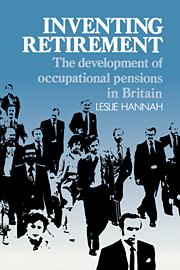Book contents
- Frontmatter
- Contents
- List of tables and figures
- Preface
- Part I The rise of pensioning
- 1 Savings, work and old age in Victorian Britain
- 2 Rival pioneers of collectivism: pensions, the state and employers (1899–1927)
- 3 The insurance challenge (1927–56)
- 4 The state: partner or competitor? (1940–78)
- 5 Competition and professionalization: the maturing of the pension market (1956–79)
- Part II The shaping of the modern pensions institution
- Epilogue: Contemporary critics and the future of pensions
- Statistical appendix
- A note on sources
- Notes
- Index
3 - The insurance challenge (1927–56)
Published online by Cambridge University Press: 03 May 2010
- Frontmatter
- Contents
- List of tables and figures
- Preface
- Part I The rise of pensioning
- 1 Savings, work and old age in Victorian Britain
- 2 Rival pioneers of collectivism: pensions, the state and employers (1899–1927)
- 3 The insurance challenge (1927–56)
- 4 The state: partner or competitor? (1940–78)
- 5 Competition and professionalization: the maturing of the pension market (1956–79)
- Part II The shaping of the modern pensions institution
- Epilogue: Contemporary critics and the future of pensions
- Statistical appendix
- A note on sources
- Notes
- Index
Summary
Old age provision is no longer a thing which is regarded by the worker on the one hand as beyond his price, and by the employer on the other as lying outside his duty. There is no doubt that in this country the demand for pensions is increasing at a remarkable rate …
Sir Joseph Burn, Foreword to Bernard Robertson and H. Samuels, Pension and Superannuation Funds, 1928, p. v.The friendly societies and trade unions had been reconciled to the insurance legislation of 1911, which provided protection against unemployment and sickness, by being designated ‘approved societies’, authorized to receive and channel contributions from members to achieve the protection designated by the Act. They had generally welcomed the earlier non-contributory pensions as lightening the burden of old age sickness and unemployment payments they had to make. However, in 1925, when contributory national insurance was extended to cover old age, the trade unions and friendly societies did not actively seek a role as a channel, and it was not offered to them. They had effectively accepted that the provision of a minimum income in old age was the business of the state. Their members now readily acquiesced in this, looking to these traditional working-class savings institutions less and less for basic protection in old age. For many decades, small numbers of the old continued to retire with benefits from trade unions and friendly societies, but it was more and more difficult for these institutions to persuade their members to subscribe for these purposes.
- Type
- Chapter
- Information
- Inventing RetirementThe Development of Occupational Pensions in Britain, pp. 31 - 45Publisher: Cambridge University PressPrint publication year: 1986



